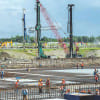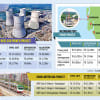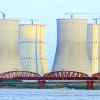Bangladesh enters nuclear world
Bangladesh on Thursday entered the nuclear world as Prime Minister Sheikh Hasina inaugurated the main construction work on the much-awaited Rooppur Nuclear Power Plant, the first-ever nuclear plant of the country.
She formally launched the main construction work on the plant by pouring concretes at the plant site at Rooppur in Iswardi, north off Pabna, in the morning.
Speaking on the occasion, Prime Minister Sheikh Hasina said, "This is a joyful day for us. Bangladesh enters the nuclear world with the beginning of the construction work of the main structure. It's a pride and joy for us as a nation."
Taking a swipe over those who are very much critical about the Nuclear Power Plant project, she said, "Many have raised various types of questions over the construction of this project. But, I think those who raise question lack self-confidence..."
"There's a quarter that raises questions in TV channels on various issues as some 23 satellite channels are in operation out of 44 channels. They shouldn't have thought that our patriotism is lesser than theirs."
Noting that her government has put utmost importance to ensuring overall nuclear security during construction of the plant, Hasina said this plant would surely be constructed in the country.
She said her government took initiatives to meet the high demand of electricity of people after taking office in 2009. "We undertook short-, mid- and long-term plans to meet the demand. Now the total electricity production capacity rose to nearly 16,000 megawatt. About 83 percent people have come under electricity coverage."
Read More: Another step closer to N-power plant
"We would get 1200 megawatts of electricity from Rooppur Power Plant by 2023 and another 1200 by the following year totalling a 2400 megawatt by 2024. Nearly 10 percent of the total production will come from nuclear energy source by that time," she said.
Hasina said her government has given top priority to the issue of nuclear safety and radiological protections while implementing the Rooppur Nuclear Power Plant. "We're strictly following IAEA safety standard and other relevant guidance as well as international good practices."
She went on saying, "We've promulgated Bangladesh Atomic Energy Regulatory Act-2012 to strengthen national nuclear regulatory infrastructure to ensure safe and secured applications to nuclear techniques and building the country's first nuclear power plant."
"Our nuclear energy programme is very transparent. The country has signed all the major international treaties, agreements and protocols related to the nuclear non-proliferation," she added.
Hasina said Atomic Energy Regulatory Authority has been continuously supervising and monitoring the safety aspects at every step of Rooppur Nuclear Power Plant construction as per Bangladesh Atomic Energy Regulatory Act-2012 and IAEA guidelines.
She said the design of Rooppur Nuclear Power Plant has been developed in such a way that it will not succumb to any accident, natural or manmade.
"We've also taken proper initiative for training of manpower for safe operation of the plants. All measures have also been taken so that it does not cause any harm to human beings and environment," she said.
Hasina said one of the main concerns of any nuclear power plant is its waste management. "Russia will take the wastes and we've struck a deal in this regard with Russia,"
Science and Technology Minister Architect Yeafesh Osman, PM's Economic Affairs Adviser Dr Moshiur Rahman, Energy Adviser Dr Towfique-e-Elahi Chowdhury, Security Adviser Major General (retd) Tariq Ahmed Siddiq, Chief of Army Staff General Abu Belal Muhammad Shafiul Huq, PM's Principal Secretary Dr Kamal Abdul Naser Chowdhury, Press Secretary Ihsanul Karim, Russian Ambassador to Bangladesh Alexander Ignatov, Russia's state-run atomic energy body Rosatom's Director General Alexey Likhachev, Chief Engineer of Bangladesh Atomic Energy Commission Md Abdur Razzak and project director of the plant and senior officials of Bangladesh and Russia were present on the occasion.
The Rooppur plant is expected to add 2,400MW of electricity to the national grid by 2024, helping the country meet the increasing demand for electricity.
The mega project is being implemented by state-run Bangladesh Atomic Energy Commission (BAEC) under the Science and Technology Ministry, with financial, technical and technological supports given by Russia through its state nuclear agency, Rosatom.
The BAEC and Russian company JSC Atomstroyexport signed a general contract for construction of Rooppur Nuclear Power Plant (NPP) on December 25, 2015.
BAEC Chairman Md Monirul Islam and Vice President of Atomstroyexport Vladimir N Savuskhin signed the contract on behalf of their respective organisations.
Atomostroyexport, the contractor appointed by Russia's state-owned atomic power body Rosatom, will construct the NPP at a cost of $12.65 billion, out of which, $10.1 billion has been fixed as base price, $1 billion for soil stabilisation and further cost, and the remaining $1.65 billion for price escalation.
On December 15, 2015, the government finalised the amount for the biggest-ever investment project in the country's history by inking an initial agreement with Russia.
Earlier in January 2013, an inter-governmental agreement was signed for the provision of a $500 million Russian loan to finance engineering design, site development and personnel training.
On November 2, 2011, Bangladesh signed a deal with Russia's state-owned nuclear giant Rosatom to construct the nuclear plant.
Russia will provide all assistance under the agreement for setting up the plant, including providing the fuel and taking back the used fuel.
A total of 262 acres of land have been acquired to set up two units of the plant with a capacity of 2,400-MW.
On October 2, 2013, Prime Minister Sheikh Hasina laid the foundation stone of the Rooppur Nuclear Power Plant at Iswardi.

 For all latest news, follow The Daily Star's Google News channel.
For all latest news, follow The Daily Star's Google News channel. 








Comments